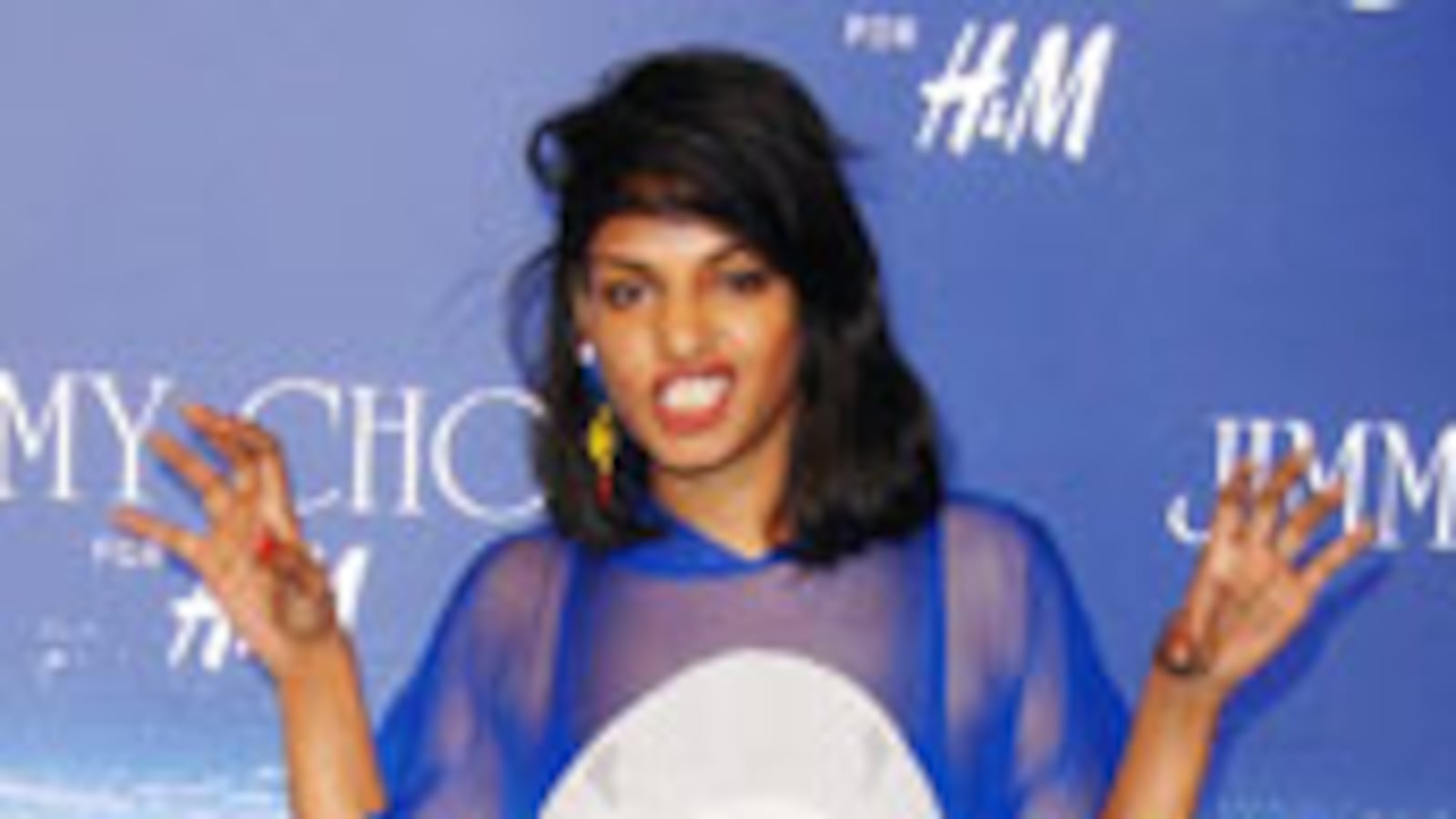
Is M.I.A. for real?
That is the question at the center of what is now known as the “truffle-flavored French fry scandal,” pitting the rapper M.I.A. against The New York Times and one of its writers.
In a piece on the cover of The New York Times Magazine Sunday, which posted on the Web last week, Lynn Hirschberg cherry-picked quotes from the artist, her friends and colleagues, and presented them next to equally distilled details, the most quoted of which was a French fry:
She ate the fries at an expensive hotel while talking about terrorism. She is still a contradiction.
"I kind of want to be an outsider,” she said, eating a truffle-flavored French fry. “I don’t want to make the same music, sing about the same stuff, talk about the same things. If that makes me a terrorist, then I’m a terrorist.”
M.I.A.’s response to the piece was childish at best. She's resorted to the Internet equivalent of pouting: First, she posted Hirschberg's telephone number on Twitter, which was supposed to prove something, I'm not sure what. (Hirschberg responded by calling the tweet “infuriating and not surprising.” Then, M.I.A. posted two audio clips from the interview, which shows that truffle fries were ordered, but at the writer’s suggestion. And then the rapper recorded something like a song, with the title, "Haters."
So, she ate a truffle-flavored French fry? Really, who cares?
M.I.A., clearly.
But then her anger with the article goes to the question of authenticity. M.I.A. has been perceived by many as an authentic artist, a person with real convictions about a controversial cause—the Tamil people of Sri Lanka, someone who lived a roughneck life, whose music was of the street and by the street and thus had cred.
Hirschberg's piece punctured that illusion.
She's so streetwise... she lives in Brentwood. Pop!
She's so badass... she eats truffle-flavored French fries. Pop!
She's from such an intense family... her father is a teacher interested in sustainable living. Pop!
Hirschberg is a storyteller; her writing puts you with the subject in a visceral way. She offers context and analysis, but employs a few manipulative tricks in her prose. The truffle-fry detail was embedded in M.I.A.'s talk about terrorism and wanting to be an outsider. In a fluff piece, what the subject ate would be presented differently, prefacing the discussion or as a way to segue into another topic. Here, that detail is employed like a dagger. She said, eating a truffle-flavored French fry.
Not exactly fair play, though that doesn't mean it’s not the truth. She ate the fries at an expensive hotel while talking about terrorism. She is still a contradiction.
Authenticity is a cherished notion in rock. If you are a true, authentic artist, the thinking goes, you write your own songs, you perform them, you don't lip sync, you are not the product of a record label or a producer. Additionally, it helps if you are dangerous or dangerous-seeming. You are Guns 'N Roses, not Poison. You are Tupac, not the Fresh Prince. You are the Rolling Stones, not the Monkees. You are M.I.A., not Lady Gaga.
Authenticity is a rare commodity, longed for by the press and critics alike, and a crack in the authenticity façade can shatter an artist's momentum with the early adopters—the sort of people who say things like, "I saw them play way back in ’86—they suck now."
M.I.A.'s narrative is that of a girl growing up as the daughter of a Tamil militant, a member of an oppressed group, who is a visionary artist, who used the most rudimentary of tools—a Roland MC-505—to create her bare-bone, entrancing, hook-filled beats. That girl doesn't live in one the poshest suburbs of Los Angeles. She doesn't eat truffle-flavored French fries. It doesn't fit her narrative. It is not authentic.
The comments from her ex-boyfriend and collaborator, Diplo, didn’t really help.
"She can’t really make music or art that well, but she’s better than anyone at putting crazy ideas into motion. She knows how to manipulate, how to withhold, how to get what she wants,” he told Hirschberg.
Perhaps M.I.A. is not used to being scrutinized by a skeptic. She has enjoyed almost uncommonly positive press, most of which has taken her narrative—and therefore, her authenticity—at face value.
I made the same mistake.
When M.I.A. told the music magazine NME that Lady Gaga is “not progressive, but she’s a good mimic,” and that she herself believed in “Do It Yourself," she essentially accused Gaga of being a fake. And while I like Gaga and have been a defender of her to many of my rockist friends, I, too, fell for this argument. I argued that M.I.A. has always been more authentic, with a strong vision and sound from the get-go. I could see why people sided more with M.I.A. over Gaga.
But then I started to think about it a little more. And I realized that the irony of the willingness of critics to side with M.I.A. over Gaga in the battle for credibility is that Lady Gaga actually has technical talent. A formidable vocalist, she sings better than most of the pop stars currently in circulation. She is also a pianist, an actress, and a dancer—what used to be known as a triple threat—and has prepared for this moment her entire life. She writes and composes her own songs. She is the real thing. She is authentic.
But, it is hard to say who is truly authentic anymore. In a weird way, Britney Spears might be one of the most authentic artists of our age. She has never pretended to be anything other than what she is: a Disney child star, who won the talent show circuit, and then went on to incredible fame, singing songs neither written nor produced by her and dancing in videos choreographed by other people. She lipsyncs, without shame.
And Britney probably wouldn't care if someone wrote that she was eating a truffle-flavored French fry during an interview.
Tricia Romano is an award-winning writer who has written about pop culture, style, and celebrity for The New York Times, the Village Voice, Spin, and Radar magazine. She won Best Feature at the Newswomen’s Club of New York Front Page Award for her Village Voice cover story, about sober DJs and promoters in the nightlife industry, " The Sober Bunch."






